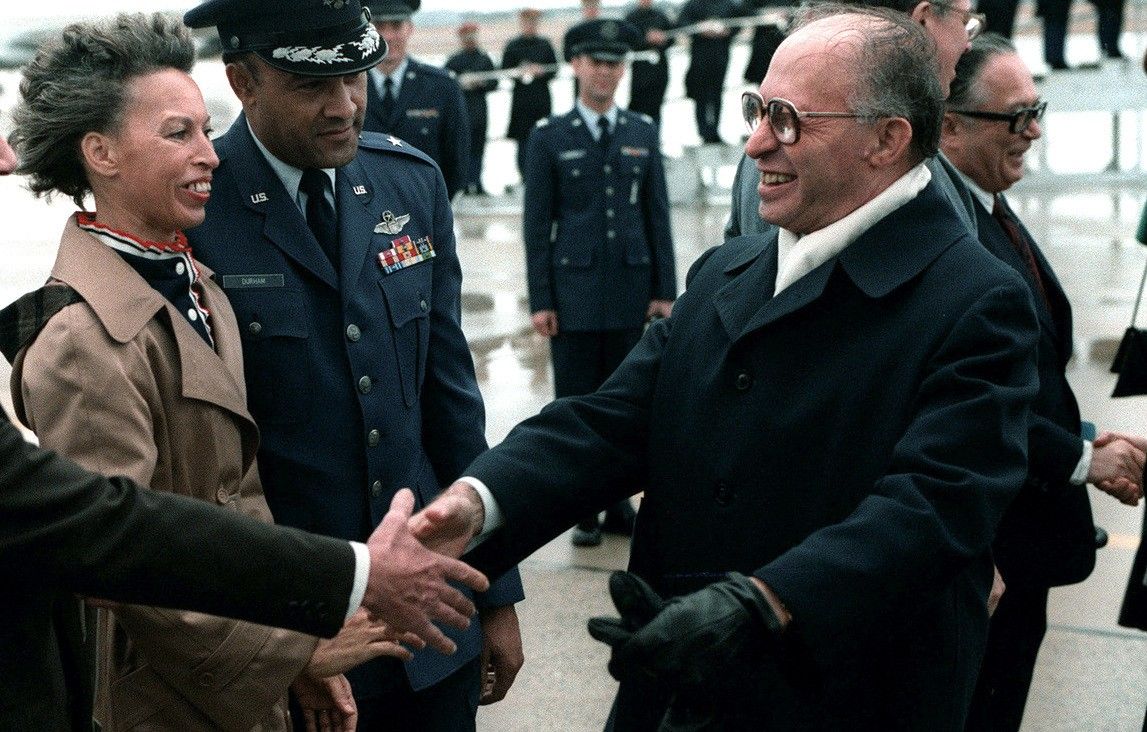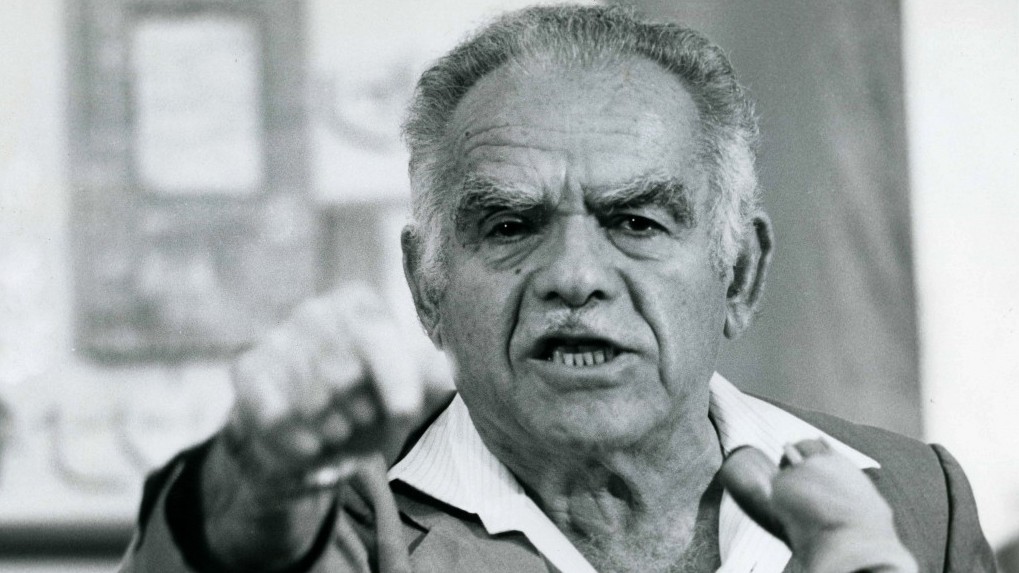
Israeli leaders Menachem Begin and Yitzhak Rabin both lead terrorist movements that killed innocent people
How We Conveniently Ignore the ‘Terrorists’ Among Our Allies
Paul R. Pillar / The Quincy Institute for Responsible Statecraft
(June 15, 2021) — The term “terrorist” often gets used as a general-purpose epithet intended to consign a disliked state or group to perpetual isolation and punishment. Used in this way, the label of “terrorist” becomes a substitute for careful analysis of policy toward the state or group in question. Usually, the object of the labeling has indeed used terrorism — but so have many others who don’t get labeled the same way and may even be treated as friends and allies. If the operative notion is “once a terrorist, always a terrorist,” then there are many shady histories that warrant examination.
Consider, for example, as Benjamin Netanyahu — who has flung the “terrorist” label at least as freely as anyone else — is finally being pushed out of the prime minister’s job in Israel, the histories of some of his predecessors. Menachem Begin, who held that job in the late 1970s and early 1980s — longer than anyone except Netanyahu, David Ben-Gurion, and Yitzhak Rabin — had an earlier career as a hard-core terrorist.
As leader of the Irgun group during World War II, Begin conducted a campaign of attacks, focused principally on British government and police targets, intended to drive the British out of Palestine — while Britain was busy waging a war against the Nazis.
Begin’s terrorist campaign continued after the war. His group’s most spectacular operation was the bombing of the King David Hotel in Jerusalem in 1946, killing 91 persons and injuring 46. The list of victims went far beyond the British administrators who were the purported targets and included people of multiple nationalities not only in the hotel but in adjacent buildings and the street.
As the British exit neared, Begin’s group used more of its terrorist tactics against Palestinian Arabs, evidently aimed in part to terrorize Arabs into fleeing their homes and villages. An especially notorious operation was the massacre in the village of Deir Yassin, in which more than a hundred Arabs, including women and children, were killed.
Begin emerged from the clandestine world after the creation of Israel as he established the right-wing Herut party in 1948. This did not erase his terrorist past — certainly not in the minds of the British, who barred him from making a visit to London in the 1950s.

Einstein Warned Begin’s Politics Echoed ‘The Nazi and Fascist Parties’
The British were not the only ones who took notice of what Begin represented. A trip by him to the United States in late 1948 elicited an open letter by Jewish dignitaries, including Albert Einstein and Hannah Arendt, protesting the visit and describing Herut as “a political party closely akin in its organization, methods, political philosophy and social appeal to the Nazi and Fascist parties.”
Herut later became the core of the Likud Party — the party of Netanyahu and the dominant party in most governing coalitions in Israel over the past four decades.
Begin’s successor as prime minister, Yitzhak Shamir, had a similar history. He was co-leader of another Jewish terrorist group of the 1940s: Lehi, also known as the Stern Gang after its founder, which was considered even more extreme than the Irgun. Besides also participating in the Deir Yassin massacre, Shamir’s group specialized in assassinations, including the murder in Cairo in 1944 of the British minister of state responsible for the Middle East.
In September 1948, the group assassinated the Swedish diplomat and United Nations mediator for Palestine, Folke Bernadotte, notwithstanding Bernadotte’s diplomatic work during World War II that had won the release of many prisoners incarcerated by the Nazis. The apparent motive for the killing was the expectation that Bernadotte, who was responsible for developing a more stable formula for Jewish-Arab peace in Palestine, would make proposals that would not give the Jewish side everything it wanted regarding Jerusalem.
The legacy of Begin and Shamir has lived on with Israeli terrorist operations that, as with the bombing of the King David Hotel, have taken out innocent victims. For example, in 1979 (when Begin was prime minister), an attack aimed at a leader of the Palestinian Black September organization used a car bomb in a busy Beirut street that killed not only the intended target and his bodyguards but also four bystanders, including a British student and a German nun, and injured 18 others.
(Six years earlier, Israeli agents had killed an innocent Moroccan waiter in Norway whom they had mistaken for their Palestinian target.) Later chapters in the story of Israeli assassinations have included the murder of Iranian scientists, with the most recent killing taking place last November.
Another Middle Eastern state that usually escapes the “terrorist” label despite a record of terrorist operations is Saudi Arabia, with the most glaring case being the butchering of a dissident journalist and US resident in 2018 in a consulate in Turkey. The operation was almost certainly ordered from the top of the Saudi regime.

A Tactic, Not a State or Group
Terrorism is a tactic. It is not a fixed set of bad guys, bad states, or bad groups. Use of the tactic is despicable but its use does not dictate a policy of ostracism and isolation, or any other specific policy, toward a regime that has used it. Whatever one thinks of Begin and Shamir, they became duly empowered prime ministers of Israel. It was necessary and proper for the United States and other countries to conduct business with them. Today, it is necessary and proper to conduct business with Israel and with Saudi Arabia, both of which are important states of the Middle East. Their terrorist practices should not preclude such business, although those practices can and should be raised as issues with those governments.
The recent Israeli and Saudi uses of terrorist tactics run against one of the major trends in international terrorism over the past four decades, which has been a decline in state sponsorship and state practice of terrorism. Reasons for the decline include the costs of being a pariah in a globalized age and the inability to play one superpower against the other ever since the USSR collapsed. But what matters for any one state are the incentives and disincentives, the opportunities and lack of opportunities, and the penalties and pandering that it faces and that shape its decisions.
The fact that some past state practitioners of terrorism have, amid changing incentives and changing circumstances, reduced or ended their use of the tactic (Muammar Gadaffi’s Libya is an outstanding example) refutes the notion that state-sponsored terrorism is a matter of certain “terrorist states” being hard-wired to indulge in the practice. That notion underlies the “once a terrorist, always a terrorist” approach often taken toward such states. And that approach leads to unfruitful ostracism rather than a management of incentives and circumstances that would make it less likely a state will engage in terrorism in the future.

An Israeli firm offers “anti-terrorism adventures” for tourists.
The Hard-wire Myth Persists
Unfortunately, the hard-wiring notion too often prevails. Iran probably is the state to which the notion is most often applied. The seemingly permanent tag of “number one state sponsor of terrorism” automatically rolls off the tongue and substitutes for any serious consideration of what, when, and why Iran has use terrorist techniques, let alone any serious consideration of what policies by other countries would tend to reduce such use in the future.
Iran’s use of such techniques has changed substantially during the four decades of the Islamic Republic, especially with the curtailment of extraterritorial assassinations of political opponents — which were similar in many ways to the extraterritorial assassinations by Israel — after that practice got in the way of better relations between Iran and European states. The most conspicuous international terrorist operations that Iran attempted in later years were direct responses to similar clandestine Israeli attacks against Iran.
Iran, like Israel and Saudi Arabia, is an important state in the Middle East. Whatever one thinks of its leaders or its political coloration, business needs to be conducted with it, on security, economic, and other matters. Merely slapping on the “terrorist state” label and using that as an excuse not to do business with Iran and to sanction it in perpetuity is not an effective way to deal with any issues involving Iran, including the terrorism issue itself.
The Palestinian organization Hamas is a prime example of a non-state actor to which the hard-wiring assumption is often applied, and where the label “terrorist group” is taken to be the only thing we need to know about the organization to formulate policy toward it. And Hamas demonstrates, like many other states and groups, how false that assumption is.
Yes, Hamas has used terrorism, but it has used other ways of pursuing its political objectives when circumstances have permitted, including competing in free and fair elections and negotiating with Israel to free prisoners and to establish and maintain armistices. Like it or not, it is a significant player in Palestinian politics and the closest thing to a local governing authority in the blockaded Gaza Strip.
The case of Hamas illustrates another shortcoming of primitive reliance on the “terrorist” label, which is failure to take full account of the moral and legal significance of other forms of political violence that harm innocent people. I have used the term “terrorism” throughout this article to conform with the official, legally prescribed US definition as used by the State Department, which refers to “premeditated, politically motivated violence perpetrated against noncombatant targets by subnational groups or clandestine agents.”
Hamas is a subnational organization, not a state, and its firing of rockets at Israeli cities can be defined as terrorism. Because the far greater civilian casualties among Palestinians have been inflicted by overt use of military force by a state — Israel — the attacks causing those casualties do not meet this definition of terrorism.
If Hamas had F-16s or other modern combat aircraft, it undoubtedly would use them rather than poorly guided rockets to strike back at Israel. It probably would aim at targets it describes as combatants while perhaps, like Israel, dismissing the resulting civilian casualties as unfortunate collateral damage. And if Hamas were the government of a recognized state, it could do all those things and still avoid having any such use of force be defined as terrorism.
Hamas is not a state and it doesn’t have F-16s. But those facts should not determine where moral opprobrium is to be applied when force results in innocent civilians getting killed and injured. Nor does it determine legal culpability with regard to war crimes, which can occur when civilians are harmed even if a military target is in the vicinity.
Relevant asymmetries are to be found not in the lines drawn by definitions of terrorism, useful though they are for many other purposes, but rather in disproportionalities in the inflicted suffering and in the circumstances that have led to bloodshed in the first place.

Posted in accordance with Title 17, Section 107, US Code, for noncommercial, educational purposes.